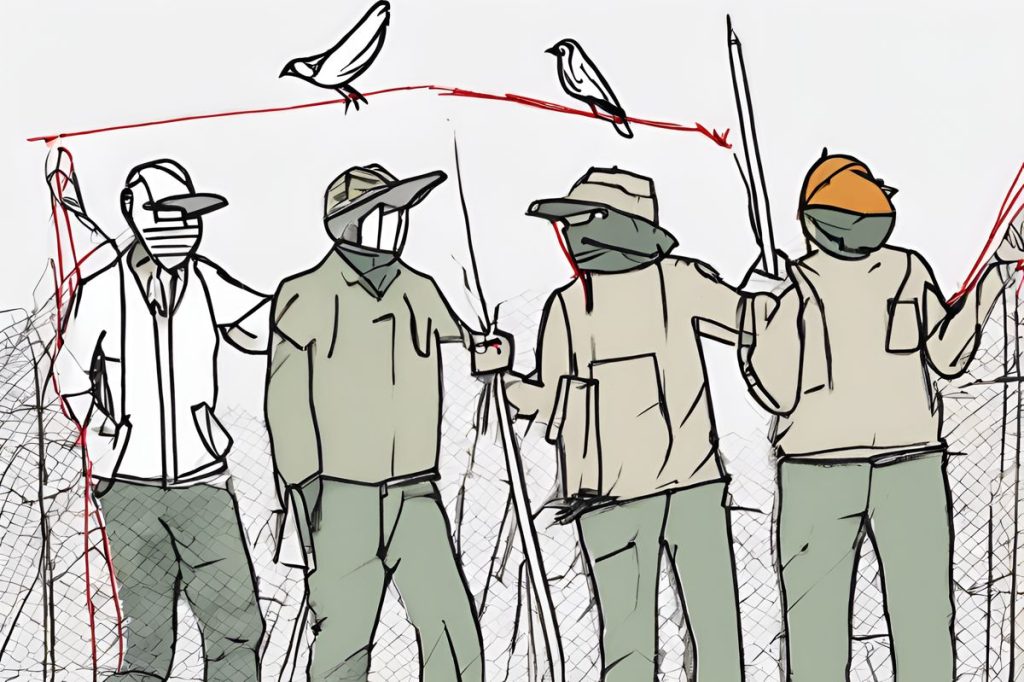Bird welfare organizations sound the alarm on the illegal trapping of 435,000 birds, including endangered species, citing lenient laws and lack of enforcement in Cyprus and British bases. They demand stronger fines and resources to protect vulnerable bird populations and combat this cruel practice.
What are the main concerns of bird welfare organizations regarding illegal bird trapping?
Bird welfare organizations are alarmed by the illegal trapping of 435,000 birds, including endangered species. They cite increased trappings due to lenient laws and lack of enforcement, notably from Cyprus’ anti-poaching unit and British base police. They call for stronger fines and better resources to combat this issue and protect vulnerable bird populations.
Bird welfare organizations have raised the alarm about the illegal trapping and slaughtering of roughly 435,000 birds, which not only includes a variety of migratory birds but also species that are on the brink of extinction. The collaboration of BirdLife Cyprus, the Royal Society for the Protection of Birds (RSPB), and the Committee Against Bird Slaughter (CABS) has shed light on these disturbing figures from last autumn’s trapping season.
Surging Illegal Trappings
The surge in illegal bird trapping, as reported by the organizations, constitutes a stark contrast to the decline observed in preceding years. This uptick, they note, is primarily attributed to the easing of laws against the usage of lime sticks, a lack of support from the anti-poaching unit of Cyprus, and the insufficient staffing within the police force of the British bases.
Despite consistent net usage within the Republic of Cyprus, the involvement of organized and notorious groups of bird trappers has been particularly noteworthy. These groups have been carrying out large-scale trapping operations. There have been instances where members of environmental organizations faced aggression from these trappers during their conservation efforts.
Calls for Action
The bird protection agencies have jointly called for a comprehensive action plan, urging the Cyprus Police Anti-Poaching Unit to collaborate with the Game and Fauna Service. Their goal is to address and mitigate this rampant illegal trapping. They’ve highlighted the disheartening reduction in fines—for the killing of up to 50 birds using lime sticks—from €2000 to a mere €200. This reduction in penalties is seen as a move that neither serves as a punishment nor as a deterrent, indirectly legitimizing this cruel method of trapping.
The organizations have further demanded that the House of Representatives revoke the law that led to the lowering of fines. They assert that fines should return to €2000, regardless of the method used or the species of birds involved.
Understaffing and Law Enforcement
The organizations underscore the challenges aggravated by the under-resourced police team at the British bases, which plays a critical role in curbing bird poaching and trapping within their jurisdiction. They call for sufficient staffing and resources to continue the strides made in recent years towards reducing trapping levels.
Furthermore, they stress the importance of revealing the full scope of the illegal bird trapping operations. They argue for transparency and accountability, insisting that only through these means can effective measures be taken to protect these vulnerable bird populations.
In light of these developments, environmental groups remain steadfast in their resolve to protect avian wildlife. Their efforts continue in the face of adversity, seeking to preserve the diversity of bird species that grace the skies. The call to action made by these organizations aims not just to enforce the law but to awaken a collective sense of responsibility towards the natural world.
What is the impact of illegal bird trapping on bird populations?
Illegal bird trapping has resulted in the capture of approximately 435,000 birds, including endangered species and migratory birds. This practice puts vulnerable bird populations at risk and contributes to the decline of various species. It is crucial to address this issue to protect the biodiversity of avian wildlife.
Why do bird welfare organizations demand stronger fines for illegal trapping?
Bird welfare organizations advocate for stronger fines for illegal bird trapping to serve as a deterrent and punishment for perpetrators. The current lenient fines, such as the reduction from €2000 to €200 for killing up to 50 birds using lime sticks, are not effective in preventing this cruel practice. By imposing more substantial fines, organizations aim to discourage illegal trapping and protect bird populations.
What resources are needed to combat illegal bird trapping effectively?
To combat illegal bird trapping effectively, bird welfare organizations emphasize the need for better resources, including increased support for law enforcement agencies like the Cyprus Police Anti-Poaching Unit and the Game and Fauna Service. Adequate staffing, enforcement of stricter laws, and collaboration between relevant authorities are essential to address this issue and protect vulnerable bird species.
How can the public support efforts to prevent illegal bird trapping?
The public can support efforts to prevent illegal bird trapping by raising awareness about the issue, reporting any suspicious trapping activities to authorities, and advocating for stronger laws and penalties against bird poaching. Additionally, supporting bird welfare organizations through donations, volunteering, and participation in conservation initiatives can contribute to the protection of avian wildlife.

